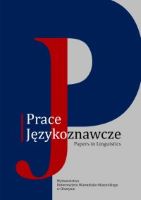Zapis komponentów odproprialnych we frazeologizmach języka polskiego
The spelling of deproprial components in phraseological units in Polish
Author(s): Iwona KosekSubject(s): Lexis, Western Slavic Languages, Phraseology
Published by: Wydawnictwo Uniwersytetu Warmińsko-Mazurskiego w Olsztynie
Keywords: Onomastics; phraseological unit; ortography; motivation;
Summary/Abstract: The article is devoted to orthographic representations of some phraseological patterns and specifically to variants in the spelling of units that come from proper names (eg. Cupid’s arrow, to cross the Rubicon, Sodom and Gomorrah, udawać Greka ‘play dumb, play possum’ lit. ‘play Greek’). The variance in spelling (either with a capital or a lowercase letter) is discussed with respect to the motivation of phraseological units, both in regard to lexicographical sources and usage (based on the corpus data in NKJP and Monco.Pl). The main part of the article discusses some possible reasons for differences in spelling as well as their normative interpretations. It appears that the spelling of the analysed units which has been adopted in dictionaries depends not so much on the units’ figurative meanings as on their motivation (in the sense of Lewicki 1982), i.e. the confirmed origin of the phraseological component from a proper name. The variance in spelling is noted relatively rarely in dictionaries (every dictionary consistently adopts one way of spelling). The existence of more than one variant is only revealed if one consults various dictionaries. For a language user who is not a specialist, the identification of a given component as a proper name (sometimes irrespective of its motivation) is typically the sole or the primary criterion for selecting a spelling variant. From a normative point of view, the best strategy would be to acknowledge the variance in spelling of the examined phraseological units if such variance occurs.
Journal: Prace Językoznawcze
- Issue Year: 25/2023
- Issue No: 2
- Page Range: 115-128
- Page Count: 14
- Language: Polish

